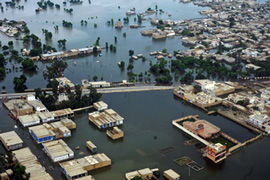Pakistan floods ‘may help’ fighters
President warns that insurgents may gain new recruits from those affected by the chaos.

His remarks were echoed by John Kerry, a US senator, who toured some of the worst hit areas and visited a relief camp alongside the president.
“We don’t want additional jihadists, extremists coming out of a crisis,” he said.
| Special coverage |
 |
Zardari’s government has been criticised for failing to respond quickly enough to the situation and Islamist charities have been active in the flood-hit areas.
One such group is Jamaat-ud-Dawa, linked to Lashkar-e-Taiba, which is believed to be behind the 2008 Mumbai attacks in India.
There are also concerns the scale of the suffering, with at least 1,500 people killed and an estimated 20 million affected, could stoke unrest and political instability that may impact on Pakistan’s fight against the Taliban and al-Qaeda.
Chaotic distribution
Local aid groups, the Pakistani army and international aid agencies have helped hundreds of thousands of people with food, shelter, water and medical care, but the distribution has been chaotic and has not come close to reaching everyone.
UN and Pakistani officials estimate that 80 per cent of the food stock has been destroyed in this country.
 |
| It is estimated that one-fifth of Pakistan’s territory has been flooded [AFP] |
“In a normal year Pakistan does export some of its produce abroad but now the authorities have two things to worry about,” Al Jazeera’s Sohail Rahman, reporting from Korta in Swat Valley, said.
“One a rise in food prices and secondly how is it going to feed its population of over 170 million over the next few months.”
Zahoor Muhammed Khan, a peach farmer in Swat, told Al Jazeera that he has had to lay off 30 of the 50 labourers working for him.
“I can’t pay them any more than I am earning from the trees,” he said.
“My outgoings don’t change. Pesticides have to be bought, tree surgeons employed to maintain the grove.”
Damage to infrastructure and crops have hit not only the agricultural sector.
“For the past 22 days, ever since the electricity was disrupted [by the rains], we have been totally unemployed,” Yunas Khan, a labourer in the town of Mingora, told Reuters news agency.
“We used to load bags of cement onto trucks, but since the rains started, we have had no work.”